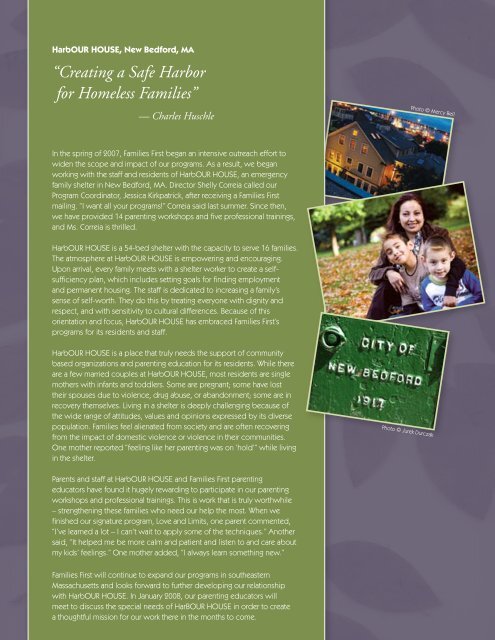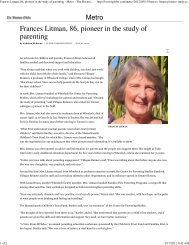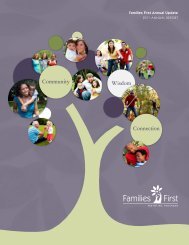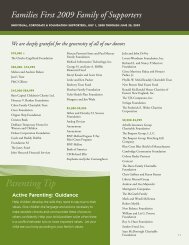FAMILIES FIRST ANNUAL UPDATE 2007 annual RePORt
FAMILIES FIRST ANNUAL UPDATE 2007 annual RePORt
FAMILIES FIRST ANNUAL UPDATE 2007 annual RePORt
Create successful ePaper yourself
Turn your PDF publications into a flip-book with our unique Google optimized e-Paper software.
HarbOUR HOUSE, New Bedford, MA<br />
“Creating a Safe Harbor<br />
for Homeless Families”<br />
— Charles Huschle<br />
Photo © Mercy Bell<br />
In the spring of <strong>2007</strong>, Families First began an intensive outreach effort to<br />
widen the scope and impact of our programs. As a result, we began<br />
working with the staff and residents of HarbOUR HOUSE, an emergency<br />
family shelter in New Bedford, MA. Director Shelly Correia called our<br />
Program Coordinator, Jessica Kirkpatrick, after receiving a Families First<br />
mailing. “I want all your programs!” Correia said last summer. Since then,<br />
we have provided 14 parenting workshops and five professional trainings,<br />
and Ms. Correia is thrilled.<br />
HarbOUR HOUSE is a 54-bed shelter with the capacity to serve 16 families.<br />
The atmosphere at HarbOUR HOUSE is empowering and encouraging.<br />
Upon arrival, every family meets with a shelter worker to create a selfsufficiency<br />
plan, which includes setting goals for finding employment<br />
and permanent housing. The staff is dedicated to increasing a family’s<br />
sense of self-worth. They do this by treating everyone with dignity and<br />
respect, and with sensitivity to cultural differences. Because of this<br />
orientation and focus, HarbOUR HOUSE has embraced Families First’s<br />
programs for its residents and staff.<br />
HarbOUR HOUSE is a place that truly needs the support of community<br />
based organizations and parenting education for its residents. While there<br />
are a few married couples at HarbOUR HOUSE, most residents are single<br />
mothers with infants and toddlers. Some are pregnant; some have lost<br />
their spouses due to violence, drug abuse, or abandonment; some are in<br />
recovery themselves. Living in a shelter is deeply challenging because of<br />
the wide range of attitudes, values and opinions expressed by its diverse<br />
population. Families feel alienated from society and are often recovering<br />
from the impact of domestic violence or violence in their communities.<br />
One mother reported “feeling like her parenting was on ‘hold’” while living<br />
in the shelter.<br />
Photo © Jurek Durczak<br />
Parents and staff at HarbOUR HOUSE and Families First parenting<br />
educators have found it hugely rewarding to participate in our parenting<br />
workshops and professional trainings. This is work that is truly worthwhile<br />
– strengthening these families who need our help the most. When we<br />
finished our signature program, Love and Limits, one parent commented,<br />
“I’ve learned a lot – I can’t wait to apply some of the techniques.” Another<br />
said, “It helped me be more calm and patient and listen to and care about<br />
my kids’ feelings.” One mother added, “I always learn something new.”<br />
Families First will continue to expand our programs in southeastern<br />
Massachusetts and looks forward to further developing our relationship<br />
with HarbOUR HOUSE. In January 2008, our parenting educators will<br />
meet to discuss the special needs of HarBOUR HOUSE in order to create<br />
a thoughtful mission for our work there in the months to come.







